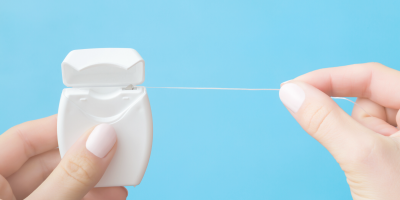Sticky, Wet and Cheap
Welcome back to another edition of Stacking Greenbacks with Zach! This is another giant Zach attack against “big dental” overpricing. Hopefully you enjoyed some 90% off on glutaraldehyde from last time! If not, click here to read up on what this series is about and how I’m going to save you money without making any major changes into what supplies you use and how you use them.
This week’s feature: Durelon
Wait.. what? Durelon?
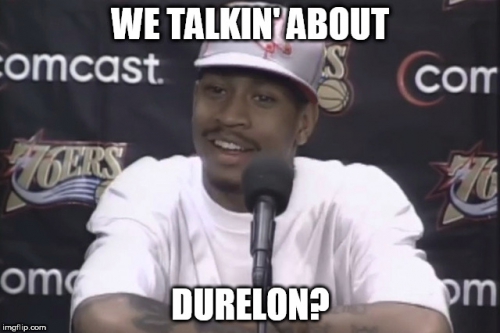
This photo from Allen Iverson’s rant on practice from probably 2003
The polycarboxylate cement that’s been around since the late 60’s? I know what you’re thinking…. “I wasn’t even born when that stuff came to market in 1968.”
FACT: Durelon was in the original fellowship to Lord of the Rings, until 3M got in the way.
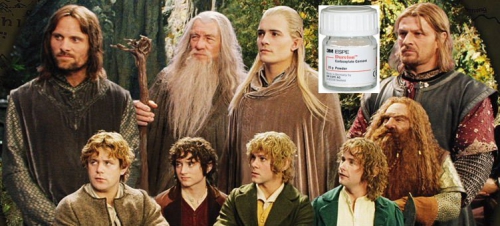
Originally the ring was entrusted to Count Durelon due to his adhesive properties. His noteworthy antibacterial properties probably would’ve been effective against the Orcs.
How do I use Durelon in my practice:
- If you have a short crown prep and need your temporary to be sure to stay in, Durelon is great. Much more adhesive than a ZOE based adhesive. No eugenol so you don’t have to worry about bonding later on, and is very kind to the tissue
- If you have an extremely retentive prep and are using a strong crown like PFM, Gold, or Zirconia, and the person has been complaining of sensitivity during the temp phase, Durelon has outstanding desensitizing characteristics. It was originally designed as a permanent luting cement and can still do that job well given the right criteria.
- Long term temporaries like during a healing phase, especially good for longer span temp bridges.
- Indirect or direct pulp capping – bonding legend John Kanca has an entire Durelon protocol for Durelon pulp caps – this isn’t the article to go into all of it, but it’s worth looking up.
How do I buy Durelon:
You can buy an introductory kit of Durelon from Henry Schein:
That kit will get you a 20 gram package of liquid and 14 ml of liquid. It also comes in fancy mixing applicaps also if you’d like to make it even more expensive.
However, Durelon has been off-patent for a really really long time. There’s nothing magical about polycarboxylate cement. But your dental school probably had Durelon and that name is etched in our minds kind of like Kleenex for tissue paper and Coke for cola.
If you search for polycarboxylate cement you’ll see a number of people have copied it. And this isn’t the bad kind of copy like Malt-O-Meal’s Toasty O’s as a bad substitute for Cheerios, it’s the good kind, like Kirkland Signature (Costco) Laundry detergent instead of Tide.
For instance a big company like Shofu makes a polycarboxylate cement called Hy-Bond:
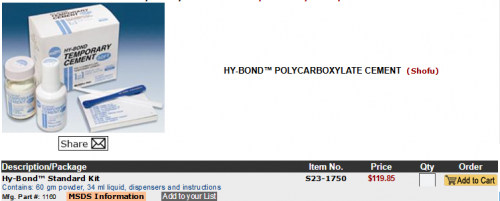
Only a few bucks less, but you are getting 3X the amount. 60 gm of powder vs. 20!
But we can do better than this, and you won’t use the polycarboxylate often enough to get the savings from the huge package.
Two different USA dental companies also make polycarboxylate cement and I’ve tried them both, they are all the same.
Dentonics, out of North Carolina has a line of generic products called Master-Dent.

If you’re scoring at home, this is slightly more powder and liquid than in the Durelon Intro kit, except it’s $15 instead of $148
A Chicago based company Dental Technology Inc also makes polycarboxylate – they sell direct:
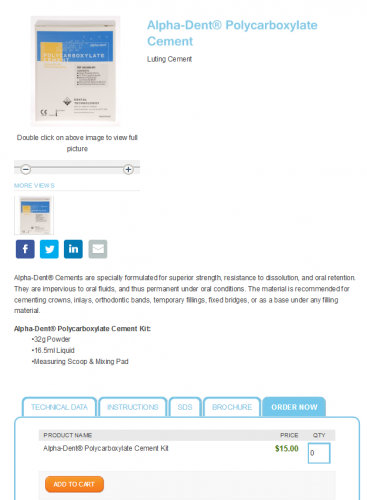
And this is even slightly less expensive because you get 32 grams of powder for the $15.
If we’re pricing this out on a per gram basis:
Durelon from Schein – $148 for 20 grams – or about $7.40 per gram
Dental Technology Inc’s Alpha-Dent Polycarboxylate – $15 for 32 grams – $0.47 a gram
That’s about a 94% savings.
So buy some generic polycarboxylate the next time you run out of Durelon, save $133, and use that dough to take some friends out to happy hour. Cheers.
